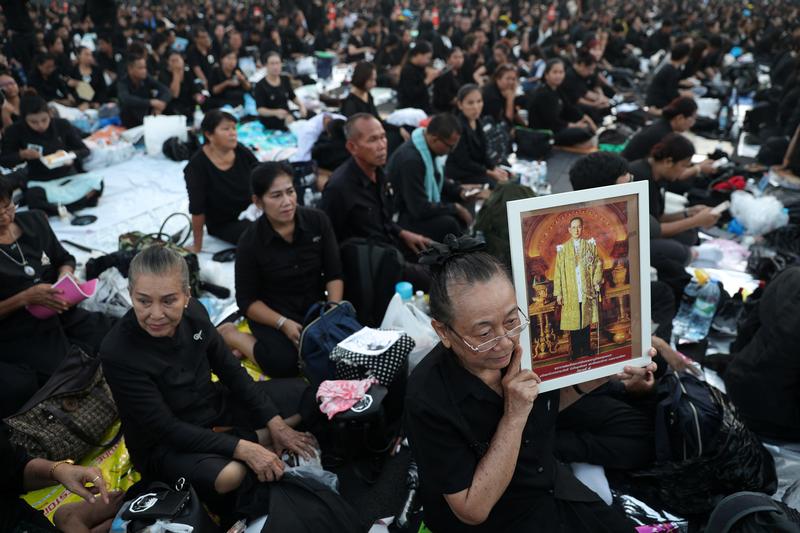BANGKOK — Amid beating drums, the whistle of an ancient flute and an artillery salute, Thailand began an elaborate ceremony steeped in ancient rites to mark the start on Thursday of a lavish cremation ceremony for revered late King Bhumibol Adulyadej.
Hundreds of thousands of mourners lined the streets of Bangkok to watch the funeral procession, with buildings on the route draped in yellow marigolds on the eve of his cremation.
Mourners dressed in black slept overnight on thin plastic mats on pavements near the Grand Palace in the Thai capital in order to secure a good view of the procession.
“This is the last goodbye. I really love and miss him. It is very difficult to describe,” said a tearful Pimsupak Suthin, 42, who travelled to Bangkok from the northern province of Nan for the funeral.
Officials dressed in blue and orange removed a symbolic golden urn from the Dusit Maha Prasart Throne Hall at the start of the ceremony.
The late king’s body, which had been lying in state at the palace since his death a year ago, was moved to the cremation area on Wednesday night.
New King Maha Vajiralongkorn, King Bhumibol’s only son, arrived at the Grand Palace dressed in a red uniform with his two daughters and young son.
He presided over religious chanting as the urn was removed by soldiers and placed onto a golden chariot. Other senior members of the Thai royal family walked behind the urn.
All television stations in Thailand broadcast the ceremony that evoked images of ancient Siam, Thailand’s former name.
Officials in charge of the ceremony said around 110,000 members of the public had gathered near the cremation area, with another 200,000 in adjacent areas in the city’s historic centre.
The king’s cremation will feature a number of ancient rites. A series of processions leading the urn wound through the streets from the Grand Palace in Bangkok’s historical quarter to the 50-metre (165-feet) high Royal Crematorium that has been erected in a square nearby.
A sum of $90 million has been set aside for the funeral, the likes of which has never been seen in Thailand, officials in charge of preparations have said.
King Bhumibol, also known as King Rama IX, died last October aged 88 after ruling for seven decades. He played a pivotal role in maintaining stability during years of political upheaval and rapid development.
Piyamat Potsopho, 38, said she had been waiting for the king’s funeral procession since Wednesday night.
“I was very fortunate to have been born under the reign of King Rama IX,” she said.
Another Bangkok resident, Suchinda Samparp, 67, said: “It’s so hard to describe the dedication I’ve seen, how people have come out to help each other and how the late king has inspired this.”
Analysts say the king’s death has left a large vacuum in the Thai psyche.
Thailand has observed a year of mourning for King Bhumibol and radio and television stations have played songs dedicated to the monarch almost non-stop since his death.
The songs urge Thais to follow in “father’s footsteps.”
[related]
King Bhumibol is often referred to as “father” by Thais and is credited with reviving the popularity of the monarchy in Thailand.
Days of heavy rain failed to deter mourners, many of whom pitched tents in order to gain the best access to the funeral.
Many businesses around the Southeast Asian nation were shut, while Bangkok’s old quarter was draped in floral garlands made of marigolds. Some government buildings placed potted yellow marigolds around portraits of the late king.
King Bhumibol was born on a Monday, a day which Thais associate with the colour yellow.



